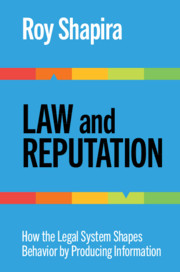1 - How Reputation Works
from Part I - Theory
Published online by Cambridge University Press: 23 August 2020
Summary
Reputation matters. Companies invest vast resources in building and maintaining a good reputation. And the threat of losing reputation once bad news about the company breaks disciplines corporate behavior to begin with. Companies anticipate that the release of damning information about them may raise the costs of financing, because investors and lenders now realize that the company has poorer internal controls than they had previously thought. Or it may raise the operational costs of the company, because consumers, suppliers, and employees now perceive the company’s operational culture to be more opportunistic than they had initially assumed.
Keywords
- Type
- Chapter
- Information
- Law and ReputationHow the Legal System Shapes Behavior by Producing Information, pp. 19 - 34Publisher: Cambridge University PressPrint publication year: 2020

